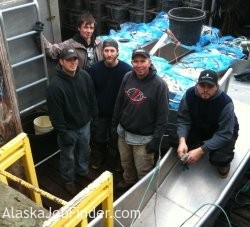A Skipper’s Job in the Alaska Seafood Harvesting Industry
Being a skipper on an Alaska fishing vessel can be pretty lucrative. But the fishing life is full of challenges. Read this exclusive interview to learn how one man became a skipper and what it’s like to work on his boat. Plus, the full interview shares proven job hunting tactics, pay information, and much more.
Access every exclusive interview and start your Alaska fishing job search
today!
Tell us a little bit about yourself.
I’m originally from Lakeland, Florida but have lived in the Pacific Northwest for the past fifteen years. I attended community college for two years and then went to sea school and the Seattle Maritime Academy to receive a 1600-ton Master of Fishing Vessel license.
I attended community college for two years and then went to sea school and the Seattle Maritime Academy to receive a 1600-ton Master of Fishing Vessel license.
I was involved with the building of a steel Alaska longliner, and served as captain for two years on it. Then, I bought a 58-foot combination fishing vessel, which I use to longline halibut and blackcod, fish for Dungeness crab on the Washington coast, and seine for salmon in Southeast Alaska.
How long have you been working in commercial fishing?
Twenty-two years.
Describe your role as ‘skipper’ (& owner)
The role of the owner is to manage an effective fish plan for each year, keep the boat in a good state of repair, be sure that we have all of the gear and supplies necessary for each fishery, and hire crew as needed.
The role of captain is to safely operate and navigate the boat, manage the crew, locate and catch fish of the best size and volume, and handle the marketing of the catch.
What roles do other people play on the vessel? Describe as best you can.
I have a deck boss/engine room guy who does oil changes in the engines, helps with repairs on the boat, manages the gear and the bait, is in charge on deck, helps train new crew, and keeps an eye on all the things the captain can’t.
I also have a deckhand who doubles as the cook. He cooks either full meals or quick meals, like soup and sandwiches, as time allows. He does what the rest of the crew does on deck; baits hooks, cleans and ices fish, coils ground line, and sets gear.
The others are all deckhands who do the same job described above.
Do crewmembers need any type of special training to get hired? Or are there some jobs that require a certain background or training, while others do not?
Crewmembers don’t need any special training to get hired, although having a mechanical background would be helpful in getting an engine room job or an assistant engineer’s position. An entry-level deckhand would not require special training.
What are the most challenging aspects of your job as skipper?
The most challenging aspect is staying on top of the rules and regulations of all the different fisheries.
Managing a crew comprised of various personalities and backgrounds that have to live and work with each other day after day can be challenging, as can be keeping the boat continuously productive and profitable.
What are the terms of employment for crew?
They are hired on a seasonal basis. Typically, I try to have the same crew for each separate fishery. They sign a contract stating they will complete each season and are paid a crew share. If they complete the season, they receive a higher percentage of the catch as a bonus.
What kind of help / advice do you give first-time crewmembers after they’re hired and before you go fishing?
We do a complete boat safety orientation, basic do’s and don’ts regarding boat life (keeping their personal gear and things put away, cleaning up after themselves), and a general explanation of what we’ll be doing and what’s expected of them.
On the occasions you have down time, how did you and the crew spend it?
It depends on where we’re at. Some of the crew enjoy sport fishing, or we go out to dinner or barbeque on the boat. We usually have lots of books on board for reading, as well as a large collection of DVDs to watch.
What personal benefits/rewards do you find from working in the Alaska fishing industry?
Getting to see many different parts of Alaska and working on the ocean; experiencing that lifestyle like only a few people do. I like having extended periods of time off for myself. No two days are ever the same in this industry.
When the weather is good and the fishing is good, and the price of fish is good, then life is great.
AlaskaJobFinder Members Get the Whole Interview. Don’t Miss Other Topics Covered, Including:
- How much you can expect to earn, and how pay is calculated
- Daily life on the boat
- Getting through job interviews
- and Much More.
There are hundreds of open jobs right now. Simply click the button below to start your job search.
